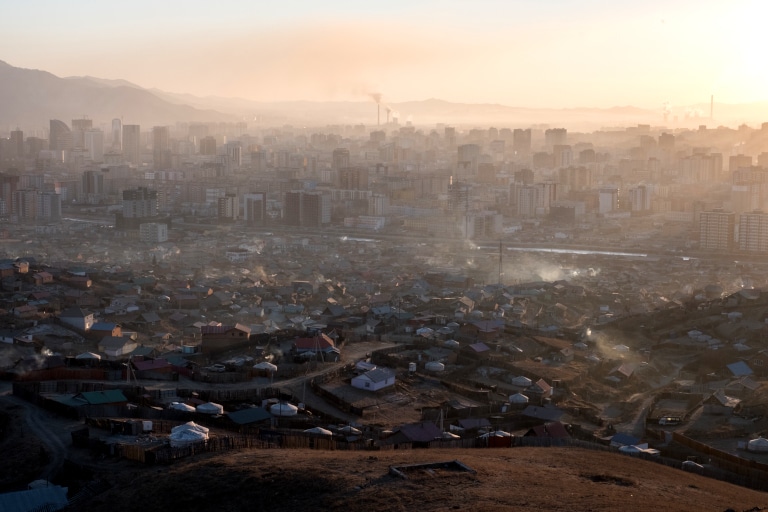Meeting families on the outskirts of Ulan-Bator in Mongolia
The extreme continental climate of Mongolia puts its population under severe pressure and is forcing some families to move to a more sedentary lifestyle and settle in the capital. Drawing on its experience in Central Asia, Geres reached out to inhabitants of the low-income districts of Ulan Bator to develop relevant solutions to improve their living conditions.
Mr Song and Ms Kha* are members of these fragile communities, having migrated from the rural plains to the city in search of a better life. This is their story.
Mr Song, a father of three children, lives on the outskirts of Ulan-Bator in a traditional yurt. After losing his livestock, he had no option but to leave his rural region and sell what animals he had left to start this new sedentary life.
Like him, almost 93% of the inhabitants of these districts were forced to migrate to the city in search of a stable income and a better life. This is why Ulan Bator’s boundaries are stretched further every day, as more and more families settle in yurts or makeshift dwellings, which are all they can afford.
The first signs of environmental, health and socio-economic distress were identified, encouraging Geres to work in this new territory, relying on its expertise developed in cold climates (Indian Himalayas, Afghanistan and Tajikistan). Geres and its local partners looked at how these insecure groups live in Mongolia and reached out to the women and men to get a better understanding of their needs and build sustainable solutions with them.
A worrying climate context
The great waves of cold weather known as “dzuds” are an absolute curse for Mongolia. These particularly vicious winters (-40°C) threaten the survival of the livestock and with it the survival of the nomad families, given that herding provided a livelihood for more than 80% of the population in 1980. Progressive desertification, accelerated by long winters, reduces the chances of restocking the herds.
Consequently, these destitute climate migrants have gathered in the city looking for new ways of living, eating and working. These districts, or rather shantytowns, on the outskirts of the city, now contain 800,000 people, close to 60% of the population of Ulan Bator. These former nomads are particularly undermined by their low level of education and can only find insecure, difficult jobs. The unemployment rate is an estimated 60% and almost a third of the population lives below the poverty line.

Difficult health and socio-economic conditions
Lacking resources, the new inhabitants of the outskirts of the capital settle in yurts, traditional canvas dwellings, ill adapted to the sedentary life, or in permanent structures which, due to lack of know-how, are often unhealthy and poorly insulated. The presence of many yurts, known as Ger in Mongolia, has given the district its name: “Ger district”. In addition, sedentarization is happening so quickly that public investment is struggling to keep up. Essential infrastructure and services such as access to running water, electricity, heating and a sanitation system are inadequate, making these districts even more insecure.
The situation is especially difficult during the eight months of winter. Faced with extreme temperatures, families burn wood or charcoal to keep warm, using stoves which give out a lot of smoke and directly affect the health of all family members. The fuels cause atmospheric pollution with a particularly high level of fine particulates, which can be as much as 12 times the limits recommended by the World Health Organization (WHO). The infant mortality rate is 17% (as against 3.5% in France) and respiratory diseases are becoming more common. Apart from the health problems, heating is also a significant expense, costing these families an average of 10% and sometimes considerably more of their income…
Ms Kha is obliged to spend 80% of her income on buying charcoal for heating in the harshest winter periods to keep her four children warm. The rest of their income is just about enough to cover the electricity bill.
Food and clothing take a back seat and the family often goes without. The house where they live was built almost 30 years ago and has never been renovated. Last spring, the roof of their house caught fire and was replaced with a light wooden structure. The walls were severely damaged and are clearly deteriorating.
The insecurity of these districts goes hand-in-hand with increasingly visible social problems: larger numbers of street children (400,000 in the capital), corruption, alcoholism, abuse, drug addiction and suicides (the third highest rate in the world: 48% of victims are men – WHO 2015).
Seeking energy solutions for the homes of vulnerable groups
In view of this and drawing on its expertise in similar situations, Geres is looking for concrete ways to tackle the unhealthiness and insecurity of the homes of these marginalized families with a view to improving their living conditions and health significantly.
Geres has set itself the objective of developing low-energy solutions for housing (equipment, insulation, etc.) and then rolling these out to vulnerable families. In the interests of sustainability, this technical engineering goes hand-in-hand with capacity-building for building professionals, involvement of local stakeholders and dissemination of good practice amongst the families. In addition, Geres supports the emergence of financial mechanisms facilitating access to these solutions for poor families. A study to measure the socio-economic impacts, on the households and the environment, of the energy solutions promoted will continue throughout the project.
If you would like to know more and even join us in taking up this challenge, contact us!
*Names have been changed to protect privacy.
WOULD YOU LIKE TO TAKE ACTION
AND SUPPORT WHAT WE DO?
Tell us who you are and find your means of action.
